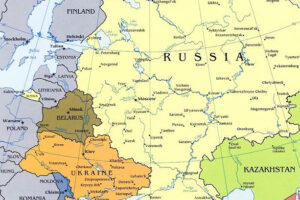Two Faces of Russia’s Foreign Policy

(Kennan Institute – wilsoncenter.org/program/kennan-institute – Maxim Trudolyubov – March 9, 2016)
Originally many in the West tended to view Russia’s Syrian adventure as yet another one of “Moscow’s gambits.” Commentators described Ukraine and Syria in the same breath. But Russia is eager to demonstrate that the two projects could hardly be more different and that Moscow can be two things at the same time.
In Ukraine, it is crucial for Russia to prevent the other side from reclaiming control of the border between the two countries. An open Russian-Ukrainian border represents Moscow’s switch for turning the military heat on and off, and is a weighty bargaining chip. In Syria, by contrast, Russia is calling for closing the Syrian-Turkish border, because Russia is in Syria to help the sitting government, not the separatists. “Border control is extremely important. It is not just the border with Turkey, but the entire border perimeter of any state. In this case, it is Syria,” said Russian Deputy Foreign Minister Mikhail Bogdanov, Russia’s presidential envoy for the Middle East and Africa, in a recent interview.
Russia has never fully acknowledged its military presence in Ukraine. In Syria, again by contrast, Russia is intentionally showcasing its military. The operation is meant to be highly visible and its extensive coverage is clearly intended to serve as an ad for Russia’s refurbished weaponry. According to a Stockholm International Peace Research Institute (SIPRI) report, Russia’s overall share of the global transfer of major arms went up in 2015 by three percentage points to 25 percent, although aggregate sales dropped in 2014 and 2015, coinciding with Western sanctions against Moscow over the Ukraine conflict.
Russia plays different roles in Ukraine and in Syria, although essentially both are proxy wars, in which Moscow has demonstrated, as Michael Kofman, a Global Fellow at the Kennan Institute, put it “that it knows how to train, equip and advise proxies to die for its political ends.” In Ukraine, Russia is disrupting a government currently aligned with the West. In Syria, Russia styles itself as a proponent of the sovereign rights of the incumbent regime. So far Russia has been successful in undermining the West and its allies in the Middle East. Moscow has effectively served as an ally of the Bashar al-Assad regime and has upset the positions of some of the U.S.- and Saudi-sponsored rebel groups. More recently Russia, together with the United States, has brokered a truce, designed mostly on Russian terms, that was still holding as of this writing.
Russian Foreign Minister Sergey Lavrov and U.S. Secretary of State John Kerry have agreed to resume peace talks sponsored by the International Syria Support Group co-chaired by Russia, the United States and the United Nations. The Saudi-backed High Negotiations Committee (HNC) said it will likely join the negotiations and acknowledged a “sharp decline” in ceasefire violations as well as progress in humanitarian deliveries to besieged towns. The Geneva III talks officially resumed on Wednesday but the negotiating process is expected to start in earnest on Monday, the 14th.
As much as Russian officials are excited about their success in Syria, they are grim about the prospects of a settlement with Ukraine. As much as Russia is pushing for peace in Syria, it is adamant in keeping the disputed Ukrainian provinces of Donetsk and Luhansk in a no-peace-no-war kind of limbo.
If Syria is now quieter, fighting between the Ukrainian armed forces and self-styled separatists backed by Russia has resumed in recent weeks, threatening to end the fragile calm that has held since Russia, Ukraine, France and Germany signed a peace agreement in Minsk, Belarus, exactly one year ago. The two sides cannot seem to agree on how the clauses of the current Minsk II agreement are supposed to be implemented. Ukraine says it needs a reliable ceasefire before it can adopt elections laws and hold polls in the East of Ukraine. Russia says it needs elections to be held before it would even think of letting go of its control of the Russian-Ukrainian border.
To complicate the situation even further, a captured Ukrainian pilot, Nadia Savchenko, is standing trial in Russia, accused of directing artillery fire that killed two Russian journalists, charges she denies. Last Friday, after her trial was abruptly adjourned, Savchenko said she would refuse food and water while in captivity.
Moscow undermines sovereignty in one part of the world and proclaims sovereignty sacred in another. There is nothing new about pursuing opposing policies in different places. There is no moral imperative requiring large powers to conduct consistent foreign policy throughout the world. On the contrary, it is only considered realist – that is, the right thing to do in international politics – to be tough where one is strong and to play for peace where one is weak.
The Kremlin considers it prestigious to play peace broker in a far-away place where Russia is only one of many players, where military build-up continues, and where war has been lucrative business for decades. Even as Moscow’s actions in Syria grab the headlines, it is the United States, as the world’s largest arms exporter, that is selling the lion’s share of its exports to the region.
No one would ever place a bet on Saudi Arabia and other major regional powers suddenly stopping their support for their preferred factions. Assad, in his turn, emboldened by a massive backing coming from a major power, has every incentive to get even more arrogant and indiscriminate in labeling as “terrorist” every force that opposes him.
Russia’s stake in the Middle Eastern conflict is far smaller than its stake in Ukraine. In Ukraine, far closer to home than Syria, where Russia is a principal stakeholder in a standoff with a much weaker opponent, where people are longing for peace and normalcy, and where a lot depends on Russia and not so much on any other power, Moscow finds it too challenging to budge from its position and seek compromise.
